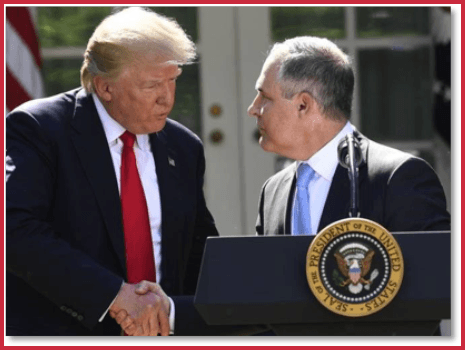EPA Administrator Scott Pruitt resigned, but for the climate it’s business as usual
By Dawn Stover | July 6, 2018
 President Trump and EPA Administrator Pruitt at the White House in June 2018. Credit: EPA
President Trump and EPA Administrator Pruitt at the White House in June 2018. Credit: EPA
Earlier this week, a 33-year-old teacher, with her 2-year-old son on her hip, approached EPA Administrator Scott Pruitt in a Washington restaurant and urged him “to resign for what you’re doing to the environment in our country.” I was watching a video of that very moment yesterday when Pruitt’s resignation popped up on my news feed.
Since then, there has been a lot of speculation about why Pruitt resigned, but it’s probably safe to say that the mother’s plea had nothing to do with it. There are at least 13 bigger reasons (and still counting) why Pruitt lost his job. A cloud of federal ethics investigations has been hanging over his head for months.
Fresh allegations emerged this week. On Monday, CNN reported that it had found discrepancies between Pruitt’s official calendar and other records—evidence that Pruitt and his aides kept some meetings and calls secret from the public. Kevin Chmielewski, Pruitt’s former deputy chief of staff for operations, told CNN that EPA staffers maintained a secret calendar with events that might “look bad.” If Pruitt falsified or concealed public records, that could be a violation of federal law.
On Tuesday, CNN turned up the heat with a report that Pruitt had approached President Donald Trump last spring with the suggestion that Trump fire Attorney General Jeff Sessions and install Pruitt as his replacement. Pruitt called the report, which cited “three people familiar with the proposal,” false.
Trump claims there was no “final straw” and that Pruitt “did not want to be a distraction for an administration that he has a lot of faith in.” References to faith also came up a lot in Pruitt’s resignation letter, in which he repeatedly blessed the president, referred to himself as blessed to serve, and wrote that he believes Trump is president “because of God’s providence.”
The question isn’t why Pruitt resigned now, but what took so long. Trump repeatedly described Pruitt’s performance as an “outstanding job,” which could be a reference to Pruitt’s skills at managing his unpredictable boss, or to his effectiveness at eliminating Obama-era policies and regulations aimed at mitigating climate change. Both Pruitt and Trump, at one time, said they wanted to get rid of the EPA, the agency tasked with protecting human health and the environment. Many environmentalists describe Pruitt as the worst EPA chief in history.
Pruitt, who received huge support from the oil and gas industry, will be replaced by Andrew Wheeler, a former coal and uranium lobbyist who is likely to carry out the same agenda. Wheeler has his own ethical issues. He is one of several dozen federal employees who are working on matters directly related to their former employers or clients of the past two years—in violation of a Trump executive order prohibiting such conflicts of interest. And while working as a lobbyist, Wheeler helped organize fundraisers for senators who would later vote on confirming his EPA appointment.
The only significant difference between Wheeler and Pruitt is that Wheeler may be more effective at flying below the media radar. The planet may be out of the frying-pan oil but headed for a coal fire.
Publication Name: Politico
To read what we're reading, click here
Together, we make the world safer.
The Bulletin elevates expert voices above the noise. But as an independent nonprofit organization, our operations depend on the support of readers like you. Help us continue to deliver quality journalism that holds leaders accountable. Your support of our work at any level is important. In return, we promise our coverage will be understandable, influential, vigilant, solution-oriented, and fair-minded. Together we can make a difference.
Keywords: Andrew Wheeler, EPA, Scott Pruitt, climate change
Topics: Climate Change, What We’re Reading














